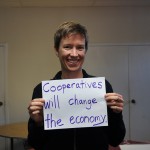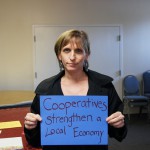Topics in our Cooperatives Legal Resource Library:
[Hay recursos en español abajo]
General Info and Resources:
What Are Cooperatives? · Support Organizations · Glossary of Terms
Types of Co-ops:
Worker Cooperatives · Freelancer Cooperatives · Producer and Marketing Cooperatives · Purchasing Cooperatives · Consumer Cooperatives · Energy Cooperatives · Artist Cooperatives · Childcare Cooperatives · Housing Cooperatives · Health Care Cooperatives · Cooperative Banks and Credit Unions · Insurance Cooperatives · Multi-stakeholder Cooperatives
General Legal Resources:
Choice of Entity · Co-op Bylaws · Financing · Governance · Patronage & Tax · Employment Law · Legal Analysis & Law Articles · Case Law and Administrative Rulings
Resources Specifically for Worker Cooperatives:
Think Outside the Boss: A Legal Handbook for Worker Cooperatives · Employee Handbooks · Converting to a Worker Cooperative
· Worker Cooperatives: Performance and Success Factors · Worker Cooperatives and Tax (Subchapter T)
Special Topics:
Cooperative Incubation · Green Jobs · Youth-Owned Cooperatives · What are Employee Stock Ownership Plans (ESOPs)?
State-by-State Co-op Law Info:
Alaska · California · Colorado · Illinois · Michigan · North Carolina
Want to help us create other state pages? Email Ricardo [at] theselc.org. Thank you!
Country-by-Country Co-op Law Info:
Co-ops Outside of the U.S.
Want to help us create other country pages? Email Ricardo [at] theselc.org. Thank you!
Recursos en Español:
Tu Negocio Cooperativa Manual
“If you want to go fast…go alone. If you want to go far…go together.”
Cooperatives aren’t some utopian, hair-brained, hippie scheme. They support an incredibly diverse range of people, from families (did you see the baby above?), to young entrepreneurs, immigrants, and faith-based communities.
Cooperatives – whether consumer, producer, worker, or housing – are turning into the viable, mainstream answer to today’s global financial crisis. Wealth is created everyday in our community, but somehow the wealth we generate flows up, up, and away. Cooperatives keep that wealth in our communities helping to build resilient, local economies.
Worker cooperatives, for example, pay themselves a wage just like any other business. When the business makes a profit (or surplus as its known within a coop), that money is given back to the worker-owners of the business, instead of going to some unknown stockholder with a Swiss bank account. Consumer cooperatives give their members discounts, at-cost rates, or a percentage of the co-ops’ profits. This is usually based on the amount the members “patronized,” or used, the co-op. REI is one of the most successful examples of a consumer cooperative in the States.
You might not know it, but if you’re a member of a Credit Union, you’re a member of a cooperative! Credit Unions are member-owned financial co-ops. Whether you choose to or not, you can vote for your Credit Union’s Board of Directors and tell them how you want the Credit Union to treat the community it serves.
The people featured above have decided they want to bring their wealth back to their communities. Will you do the same?



















